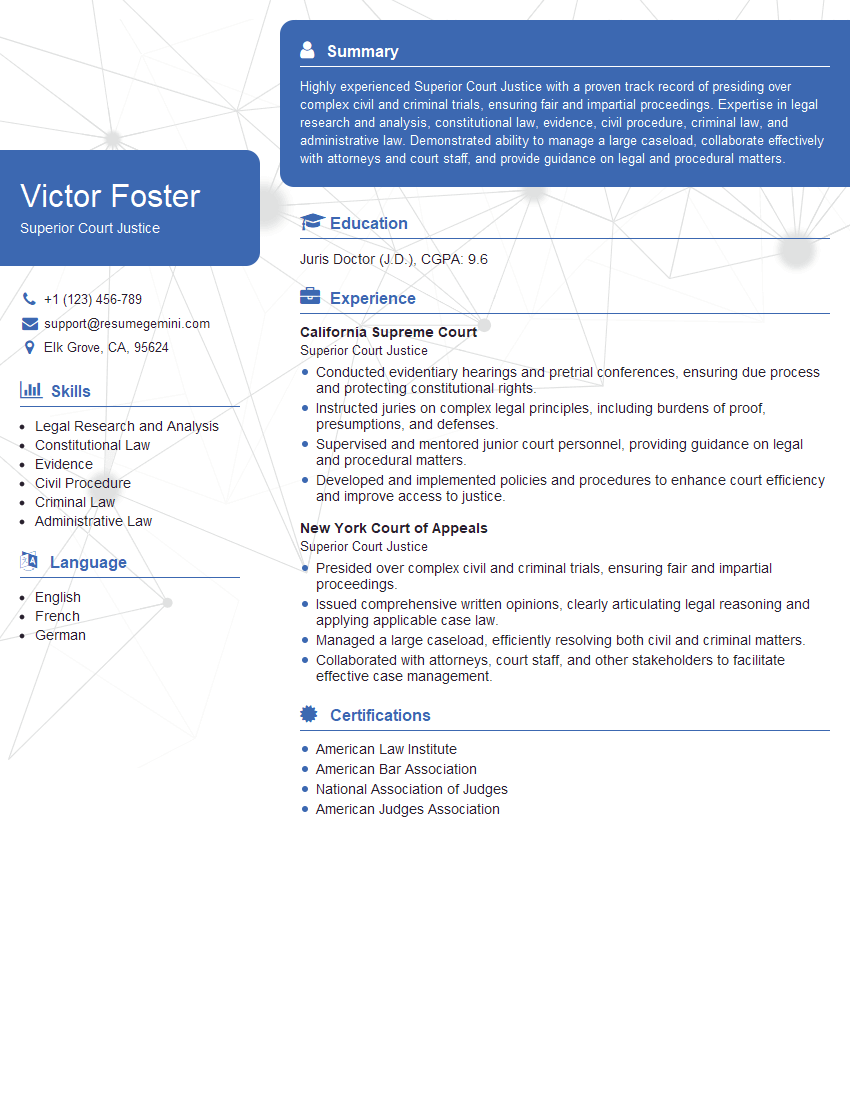Are you a seasoned Superior Court Justice seeking a new career path? Discover our professionally built Superior Court Justice Resume Template. This time-saving tool provides a solid foundation for your job search. Simply click “Edit Resume” to customize it with your unique experiences and achievements. Customize fonts and colors to match your personal style and increase your chances of landing your dream job. Explore more Resume Templates for additional options.

Victor Foster
Superior Court Justice
Summary
Highly experienced Superior Court Justice with a proven track record of presiding over complex civil and criminal trials, ensuring fair and impartial proceedings. Expertise in legal research and analysis, constitutional law, evidence, civil procedure, criminal law, and administrative law. Demonstrated ability to manage a large caseload, collaborate effectively with attorneys and court staff, and provide guidance on legal and procedural matters.
Education
Juris Doctor (J.D.)
January 2015
Skills
- Legal Research and Analysis
- Constitutional Law
- Evidence
- Civil Procedure
- Criminal Law
- Administrative Law
Work Experience
Superior Court Justice
- Conducted evidentiary hearings and pretrial conferences, ensuring due process and protecting constitutional rights.
- Instructed juries on complex legal principles, including burdens of proof, presumptions, and defenses.
- Supervised and mentored junior court personnel, providing guidance on legal and procedural matters.
- Developed and implemented policies and procedures to enhance court efficiency and improve access to justice.
Superior Court Justice
- Presided over complex civil and criminal trials, ensuring fair and impartial proceedings.
- Issued comprehensive written opinions, clearly articulating legal reasoning and applying applicable case law.
- Managed a large caseload, efficiently resolving both civil and criminal matters.
- Collaborated with attorneys, court staff, and other stakeholders to facilitate effective case management.
Certificates
- American Law Institute
- American Bar Association
- National Association of Judges
- American Judges Association
Languages
- English
- French
- German
Career Expert Tips:
- Select the ideal resume template to showcase your professional experience effectively.
- Master the art of resume writing to highlight your unique qualifications and achievements.
- Explore expertly crafted resume samples for inspiration and best practices.
- Build your best resume for free this new year with ResumeGemini. Enjoy exclusive discounts on ATS optimized resume templates.
How To Write Resume For Superior Court Justice
- Highlight your most relevant experience and skills in your resume, tailoring it to the specific requirements of the job posting.
- Use action verbs and quantify your accomplishments whenever possible.
- Proofread your resume carefully for any errors before submitting it.
- Consider seeking feedback from a career counselor or professional resume writer to enhance your resume’s effectiveness.
Essential Experience Highlights for a Strong Superior Court Justice Resume
- Presided over complex civil and criminal trials, ensuring fair and impartial proceedings.
- Issued comprehensive written opinions, clearly articulating legal reasoning and applying applicable case law.
- Managed a large caseload, efficiently resolving both civil and criminal matters.
- Collaborated with attorneys, court staff, and other stakeholders to facilitate effective case management.
- Conducted evidentiary hearings and pretrial conferences, ensuring due process and protecting constitutional rights.
- Instructed juries on complex legal principles, including burdens of proof, presumptions, and defenses.
- Supervised and mentored junior court personnel, providing guidance on legal and procedural matters.
Frequently Asked Questions (FAQ’s) For Superior Court Justice
What is the role of a Superior Court Justice?
A Superior Court Justice is responsible for presiding over complex civil and criminal trials, ensuring fair and impartial proceedings.
What are the qualifications to become a Superior Court Justice?
The qualifications to become a Superior Court Justice typically include a Juris Doctor (J.D.) degree, admission to the bar, and a proven track record of legal experience, particularly in the areas of civil and criminal law.
What are the key skills required for a Superior Court Justice?
Key skills for a Superior Court Justice include legal research and analysis, constitutional law, evidence, civil procedure, criminal law, and administrative law.
What is the average salary for a Superior Court Justice?
The average salary for a Superior Court Justice varies depending on factors such as location, experience, and the size of the court. According to Salary.com, the average salary for a Superior Court Justice in the United States is around $175,000 per year.
What is the job outlook for Superior Court Justices?
The job outlook for Superior Court Justices is expected to be competitive, as there are a limited number of positions available and many qualified candidates seeking them.